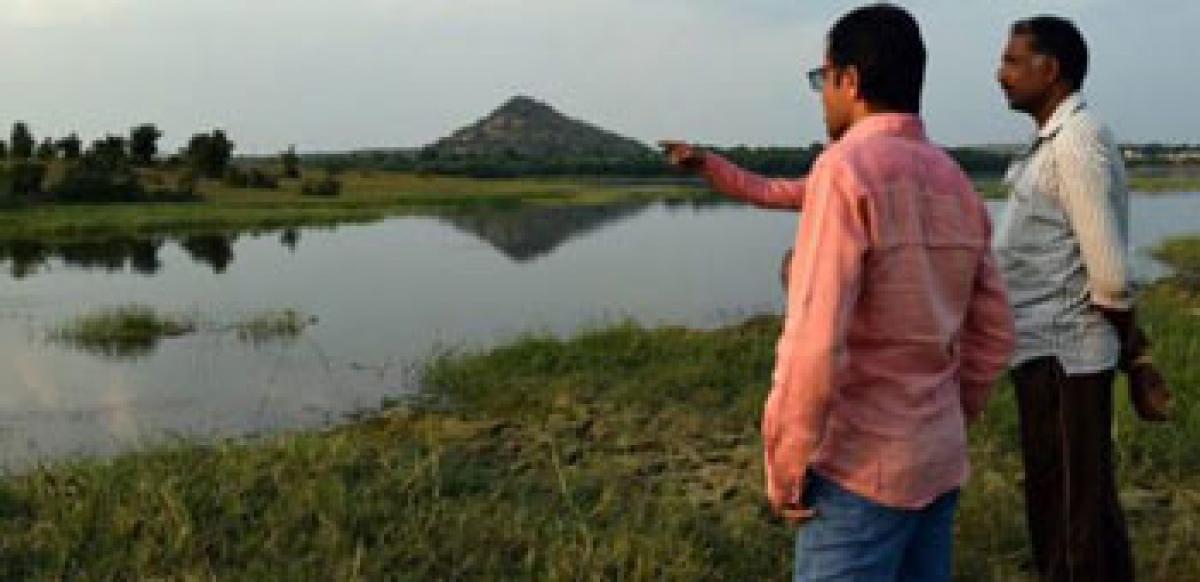Live
- Handloom Market Celebrates 10 Yrs
- IHM Hyderabad Hosts Spectacular Christmas Gala
- An Evening of Ethnic Elegance: Taruni’s Exclusive Fashion Showcase
- Style Banarasi with these 5 modern twist this wedding season
- Akansha flaunts seductive look
- Ajith requests fans to drop ‘Kadavuley’ tag, prefers simplicity
- ‘Pushpa 2’ BTS: Rashmika’s transformation as Srivalli
- Sreeleela inaugurates South India Shopping Mall at Ongole
- Nuveksha steals the spotlight
- Rana’s wife Miheeka take social media by storm
Just In

When residents of a city in one of India\'s most water-stressed regions banded together with authorities to de-silt their local reservoir, they were trying to secure the future of their drinking water supply.
 A citizen-led action has become a model for what’s possible to protect water supplies in India. Residents of Yavatmal in Vidarbha district in Maharashtra took up a crowd-funded project to de-silt the Nilona reservoir at a cost of Rs 3.5 million. 12,000 people donated labour and govt also provided some funds, necessary expertise and approvals
A citizen-led action has become a model for what’s possible to protect water supplies in India. Residents of Yavatmal in Vidarbha district in Maharashtra took up a crowd-funded project to de-silt the Nilona reservoir at a cost of Rs 3.5 million. 12,000 people donated labour and govt also provided some funds, necessary expertise and approvals
Yavatmal : When residents of a city in one of India's most water-stressed regions banded together with authorities to de-silt their local reservoir, they were trying to secure the future of their drinking water supply.
But the activists discovered that the silt that clogs the Nilona reservoir, 750 km (470 miles) east of Mumbai, could also boost harvests in this drought-stricken area, where crop failures have driven thousands of farmers to suicide. Their innovative model of crowd-funded, citizen-led action has become a model for what’s possible to protect water supplies in India, backers say. Residents of Yavatmal in Vidarbha district rely for their water on an earth-lined reservoir 10 km away.
The nearly 700 metre-long lake, built in 1972, originally had a capacity of 6.39 million cubic metres, but this has fallen by at least a third as soil has washed into the lake, according to government estimates. Local activists contend that the silt, combined with vegetation growing along the edges of Nilona, has reduced its capacity by as much as half. In drought-ravaged Vidarbha district, thousands of farmers have killed themselves in the past two decades because of crop failures and debts.
Alok Gupta, a 45-year-old doctor in Yavatmal, was inspired to act after hearing a talk a by a physician-turned-activist who had spearheaded efforts to revive over a dozen reservoirs across Maharashtra. “It was a wake-up call for us,” recalled Gupta, who is a member of Prayas, a network of professionals who promote civic action for social causes. “The water supply was already inadequate. How would we survive if it got worse?”
Local government officials initially argued that Nilona would not become completely silted up for another 20 years, at which point they planned to divert water from the Bembla reservoir, 25 km away. The government estimated the cost of digging canals from Bembla to Nilona at 25 million rupees ($377,000).
But the Prayas members wanted to act sooner, and they proposed an alternative: Mission Deep Nilona (MDN), a crowd-funded project to de-silt the reservoir at a cost of Rs 3.5 million. The response was overwhelming, said Avinash Saoji, founder of Prayas. MDN raised 2.3 million rupees of its 3.4 million rupee budget from private donations. The government provided the remainder and helped get the necessary approvals from agencies.
Apart from cash, donations also came in the forms of dredgers, trucks and free labour. “A total of 12,000 people donated labour, helping clear grass, water weeds, pebbles and mud. Some served free food and drinks,” Saoji said. MDN was formally launched in April 2015. By the end of May, MDN had removed the first 35,000 cubic metres of the 6.3 million cubic metres of silt clogging Nilona.
For MDN’s leaders, what they did with that silt is a highlight of their story. “Silt increases soil fertility. If farmers use the silt from Nilona, they can get a higher (crop) yield. In turn, we don’t have to worry about its disposal,” said Gupta, who volunteer’s as MDN’s project director. In January, the group plans to remove a further 100,000 truckloads of silt. Several check dams and canals are also due to be constructed over the next several years.
By Stella Paul

© 2024 Hyderabad Media House Limited/The Hans India. All rights reserved. Powered by hocalwire.com







